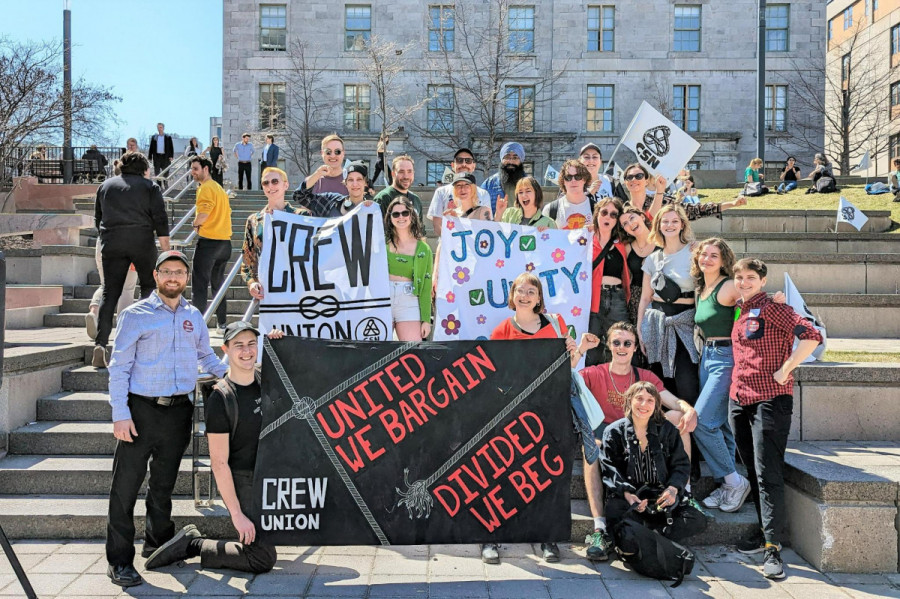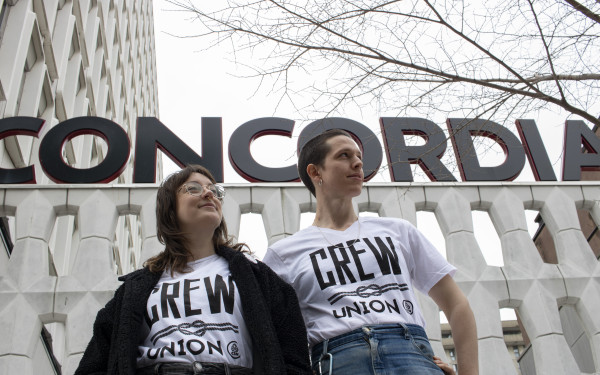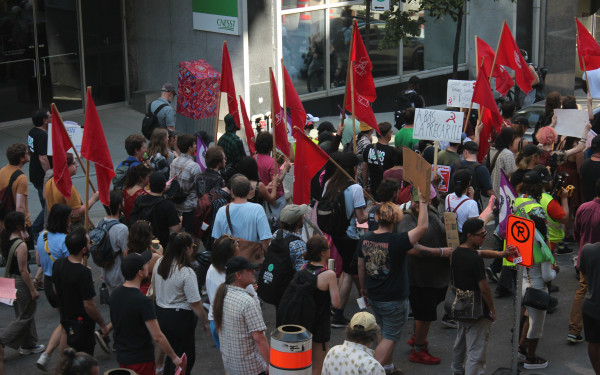Where TRAC ends and CREW begins
TAs and RAs, their fight for autonomy, and better working conditions.
On April 3, 1,700 union cards signed by Teaching Assistants and Research Assistants of Concordia (TRAC) were submitted to the Tribunal Administratif du Travail (TAT) to recognize the Concordia Research Education Workers (CREW), affiliated with the Confédération des Syndicats Nationaux (CSN), as a union which represents Concordia's TAs and RAs.
“The name itself is kind of like a seed of resistance or pushback because our job is much more substantial than just necessarily being an assistant or a marker,” said Stephanie Eccles, a fifth year PhD student who was the former secretary treasurer of TRAC. She now holds the title of CREW's coordinator.
“This year is a significant year as it's a bargaining year, “ Eccles explained.
The CREW-CSN campaign came out of a longstanding desire from TAs and RAs at Concordia to have a stronger collective agreement, sequentially nearly 81 per cent of TAs and RAs penned their name to a card in hopes of replacing TRAC.
CREW seeks to diminish addressing workers simply as TAs and RAs. CREW’s name is a testament to the fact that they are not just assistants. Eccles highlights the work that TAs and RAs do: leading tutorials, classes, teachings, and preparing materials for lectures.
Zachary Mitchell is a TA and RA in the history department. He is also a former TRAC delegate for his department and joined CREW as a militant. He was a part of the bargaining committee when it was first formed and when they later collectively resigned.
“Every time we talked about ‘well how could that change come about’ it landed on the topic of PSAC, our parent union, who we were affiliated with,” Eccles said.
Mitchell was elected as one of the negotiators. He was going to be sitting at the table with the Public Service Alliance of Canada (PSAC). Bringing forth TRAC’s demands and discussing a new collective agreement. PSAC’s response and attitude in those meetings made it a no-brainer for him that change was needed.
“[There’s] no appetite for the type of changes that we’re really looking to bring to our collective agreements. No appetite for mass mobilization, no appetite for actual fighting. Which is what it takes when you want to win substantially at bargaining,” noted Mitchell.
Mitchell was already skeptical of PSAC. His friends and colleagues who had been involved in unions parented by PSAC often expressed their displeasure with the union’s approach to bargaining and union democracy.
Mitchell emphasized that in the first meeting with the PSAC officer, the organization told the members to lower their expectations, and that PSAC is going to take care of all monetary-related matters. Members were told that if they get a bad deal, they just have to sell that bad deal to the members. Any demand which was regarded as substantive – meaning more than just tweaking words in the agreement, was “frowned upon”.
“It was heavily implied that ‘you can fight against this, but you are not going to win," Mitchell said.
The bargaining demands are as follows:
- Wage increases to combat the cost of living and matched to inflation; for example, according to Mitchell since June 2020 TA and RA pay has increased by five per cent.
- Clear contract definitions and standards. Eccles underlines “right now we don’t have a definition of what a TA or RA is [...] which leaves it to being very vague and exploitable.”
- Timely contract processing and payment. For example: “Concordia is awful at paying on time [...] they are consistently late for payment,” Eccles noted. “In a workplace that would be unacceptable. Because sometimes you wait like two months to get paid (by Concordia).” Eccles mentions how students with doctorates get paid the most, followed by those with masters, and then undergraduates the least. Eccles says it is unfair because they are all doing the same work. All workers will be paid equal rates for equal work.
- A more democratic and inclusive union structure, to push forward the demands of members on issues such as sexualized abuses of power in our workplaces.
Mitchell joined CREW for two main reasons, which left him with feelings of frustration, disappointment, and neglect.
Firstly PSAC’s mishandling of sexual violence in the philosophy department.
“A union is supposed to be about the rank-and-file, about the workers, about fighting for better working conditions, better pay, and addressing issues in the workplace. And the inaction of PSAC isn't because we have a great workplace that is flawless [...] it's really because they’ve turned a blind eye,” Mitchell told The Link.
Secondly, PSAC’s lack of transparency dismayed Mitchell. “I feel like a cash cow [...] they take a couple hundred thousand dollars in dues money every single year and we never see that back. We never see that investment in services, [and/or] investments in addressing any issues within our workplace,” he said. He believes there is not a willingness to be transparent with the ways TRAC’s dues were handled.
Mitchell expressed his concerns with how the dues are handled and how, especially as a rank-and-file member, he never really knew where his money would go. Mitchell does not think it is done with malicious intent but he does believe PSAC’s lack of transparency is a result of their structural flaws, which leans into why CREW decided to affiliate with CSN.
CSN is the largest confederation of unions in Quebec affiliated with a number of Concordia's unions, and the Association of Graduate Students Employed at McGill (AGSEM). AGSEM is the labour union that represents graduate TA’s and invigilators.
“We are the only accredited autonomous TA union. We have an affiliation with the CSN, but really we are on our own. We have no parent that is going to come in and fix things for us. It is really about the members' participation,” Kiersten Van Vliet, AGSEM Mobilization Officer told The Link. “I think ultimately that makes a much stronger collective. Because nobody is limiting our demands. We are the workers, we know our working conditions.”
According to Eccles, CREW has autonomy over their demands with CSN whose goal is to support the union.
With CSN, the whole process of collecting dues is night and day compared to PSAC’s collection practices. Mitchell explains that instead of handing all of their dues to PSAC and getting a portion of them back, CREW would actually be responsible for collecting all the dues themselves, and transmitting the necessary portions for the affiliation fees to CSN themselves.
“Every step of the way there’s transparency, there’s accountability [...] I don't think unions work well when there is this opacity. The best unions are transparent, autonomous and are democratic,” said Mitchell. “We are tired of being treated as kids at PSAC’s table. We are ready for our own autonomous local union.”
In their attempt to leave PSAC, CREW-CSN needed to act fast to campaign and have all their cards submitted to the TAT 60 days before the collective agreement expires; which was agreed upon by both parties as of April 3, or else they would have to wait another three years to attempt to leave PSAC.
In the Quebec labour code, there is a clause that states if a collective agreement has not been filed and is not filed for a period of 60 days after it has been signed, the union is fair game and open to be raided: replaced by a challenging union, typically by election.
PSAC had failed to file the previous collective agreement with the TAT. To make a collective agreement enforceable it must be filed immediately after it has been negotiated.
Because PSAC was negligent in filing the collective agreement, it meant that their collective agreement was not technically enforceable. Union members were working without the legal protection of a collective agreement. Additionally, the failure to file the agreement means PSAC-TRAC was open to being raided the entire time.
“They found a legal loophole they exploited that to be able to force us into this position,” Mitchell emphasized.
“We are tired of being treated as kids at PSAC’s table. We are ready for our own autonomous local union.” — Zachary Mitchell
CREW’s campaign was working under the assumption that the collective agreement had been filed. However, PSAC realized they had failed to file their collective agreement, giving themselves additional rights and the power to raid themselves; permitting PSAC-TRAC to re-file a petition to unionize the TA’s and RA’s at Concordia on May 26 — instead of the legally agreed upon April 3 date. This allowed for CREW’s majority to be contested in court. The two unions will now enter another secret ballot anticipated to be held in the coming fall semester.
“If the PSAC had filed the agreement with the TAT then they wouldn’t have been able to undermine the card drive. CREW would’ve won already,” Van Vliet emphasized.
The loophole which has prolonged the entire process has left TRAC feeling additionally disappointed. Johnson Zhu is the recently elected Mobilization officer for TRAC who was previously a TRAC computer science delegate. Zhu told The Link that he voted for the transition from TRAC to CREW.
“We made that decision all together— so technically I was a part of the transition as well,” Zhu said. He felt frustrated because he is not getting the results of bargaining a better collective agreement that he was promised. “After we talked with several members, that is what they feel as well.”
Zhu is concerned about having no signed collective agreement. He wants a pay increase, and he doesn’t feel it will happen with all of this union drama.
He decided to become a TRAC executive as he believes someone should try and get on the road to get things back to normal so that they can finalize their collective agreement. “We want to focus on bargaining as soon as possible and start right now. To get our wages increased,” stressed Zhu. “We are focused on bargaining and that is our main focus.”
However, he doesn't believe the TAs and RAs will be getting a new collective agreement soon. “It [bargaining] probably will happen after the secret ballot is done, and whoever wins, they need to [...] start bargaining. So hopefully, we can get a collective agreement by next year. And that is probably the best result we can get,” Zhu explained.
Zhu believes time was wasted on campaigns when the effort could have been put into bargaining.
In terms of the secret ballot, Mitchell urges, “The sooner the better, just on principle. Again, we talk about urgency, we talk about the need for a better deal [...] There is a bigger fish to fry. We don't want to be spending time with this, we want to be spending time fighting for better working conditions.”
In order to win, CREW needs support: 50 per cent of a list that will be determined by the labour board has to vote in the secret ballot. If 50 per cent of them do not vote, PSAC will by default win as the incumbent.
“There has to be a sufficient turnout to ensure the votes count,” Mitchell mentioned.
If CREW wins, Mitchell explains, they will convene a general assembly (GA), adopt a constitution, and convene another GA a short time later to elect their first executive where they will subsequently begin the proceedings for bargaining.
“This was a movement, a campaign started by Concordia TAs and RAs, this is a campaign that has been led every step of the way by Concordia TAs and RAs, and this is a campaign that is going to live or die based on the decision of Concordia TAs and RAs,” said Mitchell.
This article originally appeared in Volume 44, Issue 1, published September 5, 2023.







